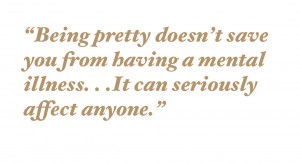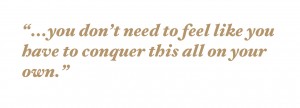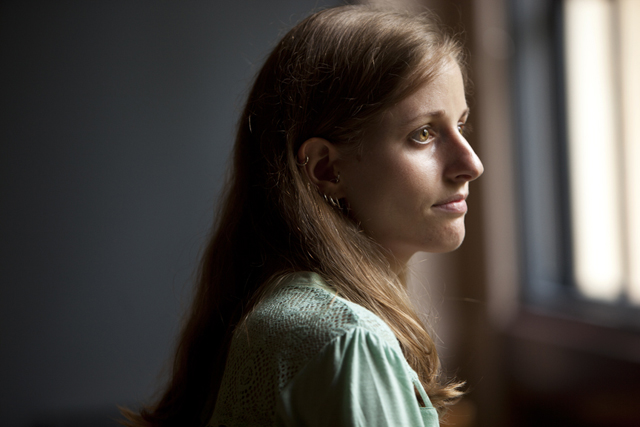Sarah
If they handed out Purple Hearts for wounds suffered on the battlefield of teenage mental illness, Sarah would have more than a few.
Her childhood, she said, was pretty normal. But as a sophomore in high school she began to feel like a different person. She was “the funny, crazy girl” at summer camp with a ton of friends, but when school started she became the quiet girl with few friends, obsessed with studies. A perfectionist, she became overwhelmed, slept only two to four hours a night and let her work pile up until she felt out of control. The loss of control scared her and feelings of hopelessness consumed her.
“I began self-harming second semester my junior year and it completely got out of control. I ended up going to a therapist and I hated that. I refused to be put on meds because I didn’t think I was crazy.”
The pressure of applying to college intensified her feelings. She applied for early admission and became so nervous waiting for the results that she made her first suicide attempt.
“I went out to my favorite restaurant, got my favorite food, for like my last meal, and I filled the car up with gas. I was crying and I just felt like there’s no point in living. I’m so hopeless about my future, I probably won’t even have one,” she said, then related a scene where she put on her favorite music, turned on the car in the garage and sat in the backseat, waiting to pass out.
 “I kept having thoughts like maybe I don’t have to do this, maybe there is a reason to keep living.” After fifteen minutes, she got out of the car and called a suicide hotline. The responder wasn’t helpful, telling her at the end of the call to “Have a nice day!” She returned to the car. Another fifteen minutes passed and she decided to make one more call, to a psychiatric day program she had attended. They sent an ambulance and she was admitted to the hospital.
“I kept having thoughts like maybe I don’t have to do this, maybe there is a reason to keep living.” After fifteen minutes, she got out of the car and called a suicide hotline. The responder wasn’t helpful, telling her at the end of the call to “Have a nice day!” She returned to the car. Another fifteen minutes passed and she decided to make one more call, to a psychiatric day program she had attended. They sent an ambulance and she was admitted to the hospital.
While recovering in the hospital her college acceptance letter came and she thought that would make everything fine. But it was just the beginning of her battle. She began cutting, something she had heard that other teens had done, and decided that was a better option than suicide. “I would cut myself if I was ashamed about something, if I was embarrassed, if my parents said something to me that upset me.” A paper she was assigned to write about herself senior year took her to another low point and she began planning another attempt on her life.
Hinting at her feelings to a therapist, he sent her to the emergency room and she was admitted into a psychiatric unit. She missed the last three days of her senior year of high school but she graduated and spent the summer planning for college.
Freshman year did not go well. Bad luck hit her this time in the form of Swine Flu. The school quarantined her and she fell immediately behind in work. “The second week of school I got completely out of hand and ended up leaving school. I had a big mental break down. I cut myself pretty badly, had gone to the ER, come back, had a panic attack, went to the ER a second day in a row and they admitted me.” When she returned to school it was decided that she should take a medical leave.
Back in Boston with her family she began Dialectical Behavior Training which she credits with giving her life skills needed to begin her recovery, but the battle she was having with herself was far from over. Out of school for months she sank into hopelessness again. It would take a final attempt on her life before she was able to escape the grip of torment.
With her parents away on a skiing trip, she prepared to end her life then went to sleep, planning on following through with her plan in the morning. She took a photograph to document her plan with her phone and before going to sleep left a message for her therapist that she may not make her appointment. Alarmed, the therapist sent paramedics who showed up banging on the doors and windows.
Sarah entered an adolescent residential hospital and quickly made friends with girls who she said understood what she was going through. A girl she had only known for a month killed herself and the devastation of that loss was so profound that she knew she could never do that to her family or loved ones. That is when she took suicide off the table. She has steadfastly stayed on the medications she received there and two and a half years later is back in college, entering her sophomore year and excited about her future.
“I’ve been through quite a bit of treatment. I think I’m a completely different person than I was two and a half years ago. I’ve just realized that there is something positive that I can get out of my struggle and I think that is helping other people.” Statistics, she said, show that one in four college students deal with mental illness and two thirds of college students are depressed and don’t get help. She joined her college chapter of Active Minds, a national organization promoting mental health awareness on college campuses, and was elected co-president this year. Mental illness is deceptive and many students suffer under the radar.
“It’s been hard, because people always told me: ‘Oh, you don’t look depressed.’ Like, you look normal, you don’t wear all black, you wear normal clothes, and that’s hard because people are like, ‘You don’t have any reason to be depressed.’ You know, I grew up in a nice town, a nice family and I’ve realized that it can affect anyone. Being pretty doesn’t save you from having a mental illness. Being a great athlete doesn’t save you. It can seriously affect anyone, and a lot of people don’t realize that.”
 After spending two years in mental hospitals, the transition back to what she refers to as “the real world” has not been easy. Being open and honest, finding people she trusts and can share her story with, and reaching out to the rest of the community with tools to help others dealing with mental illness have given Sarah the purpose she felt was lacking in her life. And finally, realizing she was not alone. “There are people out there with the strategies that can help you. There are great professionals, psychiatrists, psychologists, therapists, and you don’t need to feel like you have to conquer this all on your own.”
After spending two years in mental hospitals, the transition back to what she refers to as “the real world” has not been easy. Being open and honest, finding people she trusts and can share her story with, and reaching out to the rest of the community with tools to help others dealing with mental illness have given Sarah the purpose she felt was lacking in her life. And finally, realizing she was not alone. “There are people out there with the strategies that can help you. There are great professionals, psychiatrists, psychologists, therapists, and you don’t need to feel like you have to conquer this all on your own.”
This fighter has finally found a group where she fits in—other veterans of teenage mental illness, survivors with a common history on different battlefields who can share not only the pain of their pasts, but the triumph of their lives.

Sarah is a warrior. I know this because I’ve worked alongside her firsthand as young advocates for mental health awareness. Sarah, you’re an inspiration and I am happy that we had the opportunity to meet. Thank you for being so open and honest about your life’s journey. You’re a tough cookie and I know you will exceed all expectations!!!
thank you so much Kim, that really means a lot to me!
Sarah your name is legion; may your story inspire others who despair.
Sarah, That you have the courage to tell your story is so wonderful. Your story and video will inspire and help many who are struggling…teens and adults. The part that I will always remember is when you talked about your friend of one month committing suicide. It is phenomenal that you had the maturity to say that suicide was off the table for you, because you did not want to be responsible for making anyone feel as bad as you did. You are an amazing woman!
Sarah, you rock! I’m glad you’re doing better now 🙂
You are an inspiration, Sarah. As one warrior to another I’d like to say that you are beautiful and worth every minute it took to get where you were. You are worth every minute it will take to get you where you are going. I think we are always in recovery in some way or another, and it is certainly a ‘battlefield’ at times. You should be really proud of yourself.
Hello Sarah,
I sat to the right of you at the Step Inside My Head presentation during the Active Mind’s National Conference at UCF, and I want to say how much I admire you telling your story. It’s not easy, and it takes a lot of courage. By speaking out you’ve helped countless other people realize they’re not alone in dealing with mental illness. I wish you all the best as you continue to stop stigma by sharing your experience and educating people. And, I hope to see you at next year’s conference!
Thank you, that is so sweet! I’m glad it had an impact on you and yes, I’ll see you at conference next year!
Sarah,
I am profoundly humbled by your story and so grateful to be working with you on the Speak Out event. I agree with you about the power of realizing we are not alone in this fight. We will persevere because we have each others’ backs. So glad we are doing this event together and I know it will be incredible.
Hello Sarah,
I am so excited to be going to the conference. Looking forward to meeting you!
Take care,
Jyoti
Hats off to whveoer wrote this up and posted it.
Dear Sarah,
I just read your story here…I have tears in my eyes. You are very brave to get through all of this. I am a mother of a 14 year old girl who is struggling with depression. I am searching out how to help her. We are very close and she does talk with me. She has mentioned cutting & suicide. I am trying to locate someone on Cape Cod for her to talk with. She is so fearful of talking with anyone. Any suggestions? Of course I’ve spoken with her pediatrician, but I don’t think they are taking this seriously and think they are so quick to put her immediately on medication….which may or may not be what she need now, but it’s the first thing they want to do!!
XO
Be well & thank you again for sharing…you are helping so many people by doing so!
<3